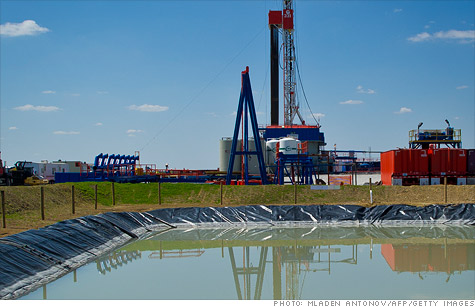
New requirements will force the disclosure of chemicals used in the fracking process in oil and gas wells on federal and American Indian lands.
NEW YORK (CNNMoney) -- The Obama administration tightened rules on hydraulic fracturing Friday, requiring the disclosure of chemicals used in the process when done on federal and American Indian lands.
The new rules will also require additional testing of oil and gas well construction and require the industry to have a management plan for the water used in the process.
"This proposed rule will strengthen the requirements for hydraulic fracturing performed on federal and Indian lands in order to build public confidence and protect the health of American communities, while ensuring continued access to the important resources that make up our energy economy," the Interior Department said in a statement.
The move is part of a broader administration effort to increase rules for the controversial practice. Earlier this month, the Environmental Protection Agency tightened air pollution requirements for new oil and gas wells.
Hydraulic fracturing, or fracking as it is known, has unleashed a boom in energy production in the United States by allowing the production of oil and gas from shale rock. It has reduced the country's oil imports, boosted natural gas production and provided thousands of jobs.
Most major oil companies are now involved in shale oil and gas production, including Exxon Mobil (XOM, Fortune 500), Royal Dutch Shell (XOM, Fortune 500) and BP (BP).
But the process has also raised fears of ground water contamination and is suspected of causing mild earthquakes.
Fracking involves injecting water, sand and some chemicals deep into the earth to crack shale rock, which allows oil and gas to more easily flow. Critics fear the chemicals are seeping into the groundwater.
About 20% of the nation's natural gas production and 30% of its oil production is done on federal lands.
The oil and gas industry has long resisted disclosing what chemicals it uses in the fracking process, arguing they were trade secrets and that disclosure would harm their competitive advantage.
But environmentalists and public health officials lobbied for the disclosure, saying it was needed to monitor for pollution and effectively treat workers involved in accidents.
The ingredients used in fracking vary widely, and can include everything from sulfuric acid and benzene to instant coffee and paraffin wax.
While the industry initially resisted disclosing the formula, it has gradually been moving in that direction under intense public pressure. Many states now require disclosure, and many companies list at least some of the ingredients on a website called FracFocus.
Environmentalists were pleased with Friday's announcement but said even more should be done.
They said the new rules only require chemical disclosure after the fracturing has been done. What's needed, they say, is disclosure before the job so residents can do baseline testing of their water.
"We think the administration can and should have done more here to protect human health and the environment," said Amy Mall, a policy analyst for the Natural Resources Defense Council. The government "should not propose rules that are weaker than what any state has on the books."
Most fracking regulations are controlled by the states, but environmentalists have argued that the federal government should play a greater role.
The industry maintains the state rules are sufficient, and having the federal government involved adds an unnecessary layer of regulation that is both costly and time consuming.
In reacting to the new rules Friday, the industry didn't seem too concerned with the proposal itself, but was leery of a bigger federal presence.
"The states have proven time and again that they are the best place for responsible regulation of drilling operations," The American Petroleum Institute's Erik Milito said in a statement. "While it appears constructive changes have been made, we are still reviewing the new proposal to see how the agency addressed the various concerns that we've raised."
The trend in fracking regulation has been moving toward an increased federal role. Many analysts say the increased regulation is both necessary to convince the public the process is safe and affordable for the industry.
The Obama administration is generally supportive of fracking, but with increased oversight.
There still exists two extremes in this fight, with some in the industry opposing any new rules and some critics arguing the process should be banned altogether.
| Overnight Avg Rate | Latest | Change | Last Week |
|---|---|---|---|
| 30 yr fixed | 3.80% | 3.88% | |
| 15 yr fixed | 3.20% | 3.23% | |
| 5/1 ARM | 3.84% | 3.88% | |
| 30 yr refi | 3.82% | 3.93% | |
| 15 yr refi | 3.20% | 3.23% |
Today's featured rates:
| Latest Report | Next Update |
|---|---|
| Home prices | Aug 28 |
| Consumer confidence | Aug 28 |
| GDP | Aug 29 |
| Manufacturing (ISM) | Sept 4 |
| Jobs | Sept 7 |
| Inflation (CPI) | Sept 14 |
| Retail sales | Sept 14 |